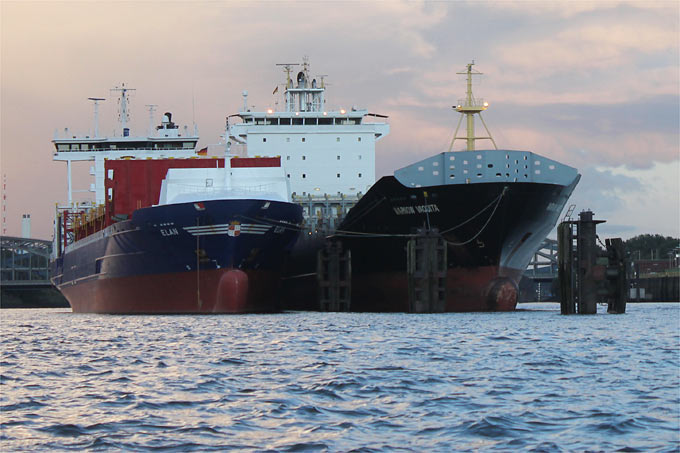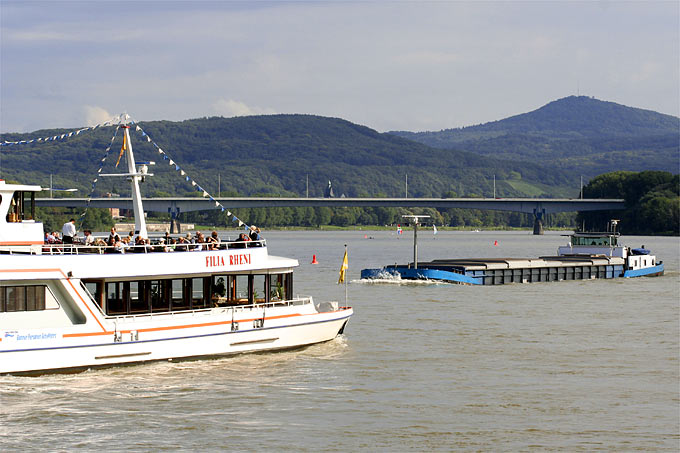Low Emission Zone on sea shows positive impact
NABU study: Stricter limits show clear improvement of air quality

Photo: Helge May
Scientists from Dutch research institute CE Delft have evaluated data from all over Europe on behalf of NABU. First time for Europe the study shows the impacts of the stricter requirements on fuel quality in Sulphur Emission Control Areas (SECA) on the environment and the maritime industry.
The study also shows that concerns of ship owners did not come true. The shipping industry had warned that stricter requirements for marine diesel would increase costs and thus shift traffic to road. The maximum allowed sulphur content of marine fuels in the Baltic Sea, the North Sea and the Eng-lish Channel had been lowered by the International Maritime Organization (IMO) from January 1st 2015 from 1.0 percent to 0.1 percent.
NABU CEO Leif Miller: "The study results demonstrate the very positive overall socio-economic balance of the SECA. By using better fuels, sulphur dioxide concentrations have been lowered by 50 percent or more. Correspondingly the costs for health impacts and environmental damage lead to lower costs paid by society. The SECA is a European success story, which sends a clear signal, to globally reinforce the standards." The exhaust pollution by international shipping is not commensurate with the present level of available systems for exhaust clarification. While emissions from cars, trucks and construction machinery are increasingly regulated ashore, shipping holds are a no longer tolerable pollution privilege. Ships have a huge pent up demand regarding environmental protection. Miller: "We need to ban toxic heavy fuel oil as quick as possible and install exhaust clarification systems on every ship."
NABU transport expert Dietmar Oeliger: "The air quality could be even better, because the major deficit of the current SECA is missing control. Currently, the checks are punctually near ports, that is why we suggest a high number of unreported cases of violations at open sea. The economic incentive to violate by burning cheaper heavy oil is simply too great while the risk of getting caught is close to zero." In addition, the fines in many countries are a few hundred to some thousands of Euros, which likely has no deterrent effect. Even from shipping industry there are many voices calling for tighter controls, as competitive disadvantages are feared due to fraudulent activities of competitors. "Permanently installed measuring instruments on board of each ship, random checks on open sea and in coastal waters as well as significantly higher penalties are necessary, to ensure compliance with existing laws," says Oeliger.
With regard to the planned reduction in the global sulfur limit of marine fuel from the current maximum of 3.5 percent to 0.5 percent in 2020 NABU can already state that the economic benefits will clearly exceed any additional costs due to higher quality fuels. "Every Euro and every Dollar that is more plugged into a cleaner navigation, people and environment will benefit up to three times. IMO must stick to the target to implement stricter limits already in four years," says Axel Friedrich, international transport expert and scientific advisor of NABU.
Conclusions of the study:
-
The air quality in coastal areas improved significantly after limit val-ues for the maximum sulphur content of marine fuels had been tight-ened in 2015 from 1% to 0.1%. Several countries found the sulphur dioxide concentrations to be decreased by 50 % or more.
-
The tightened sulphur limit values in the North and Baltic Sea reduced socio-economic costs siginificantly. In particular the costs for health and environmental damages were found to be lower than in previous years. Other external costs e.g. for the damage to buildings or crop losses are less important and were not quantified but are likely to have also decreased because of the lower sulphur loads
-
Socio economic costs are lowered by between 4.4 to 8.0 billion EUR per year. When comparing this benefit to additional costs of 2.3 billion EUR annually due to higher bunker prices the cost-benefit-ratio is be-tween 1.9 and 3.5.
-
There have been no issues regarding the availability of marine fuels with a maximum sulphur content of 0.1%. Moreover, no significant increase for bunker prices were found particularly as low oil prices were at low levels.
-
The price for marine gas oil (MGO) even went down more than for heavy fuel oil (HFO) and road diesel therefore decreasing disproportionately.
-
RoRo ferries and short sea shipping which were assumed to be the most affected businesses as they operate almost exclusively in the SECA zone. They have not faced negative impacts due to the tightened sulphur standards according to statements from the industry itself. Some shipping companies even reported a financial record year for the year 2015 and established new services
-
Consequnetly, there have been no reports of significant major shifts to road transport along SECA areas.
-
When it comes to control and enforcement EMSA data reported that 3 – 9% of the checked ships did not meet legal requirements. Experts indicate that the rate of non-compliance on open seas might be significantly higher, but the limited available data does not allow to draw conclusions on this aspect. Therefore, more and better data are needed in order to estimate the actual compliance rate on open seas.
-
Additional monitoring and control techniques need to be developed in order to reduce the current inaccuracies and increase the intelligence of the monitoring system. This should result in better control of behaviour on open seas.
-
The number of fuel sample analyses needs to increase significantly in order to perform the quota of controls required by the European legislation. Authorities should take responsibility in order to meet the targets, train staff and use state of the art equipment.
-
Only in 30% of all non-compliances sanctions are applied. Sanctioning should be proportionate to the economic benefits of not complying with the regulations. Furthermore, information on non-compliance should be send to the next port of destination in order to allow better control.
Complete report
More Information
Busses, Trains, Cars and Bicycles – there are manifold possibilities and means of transportation to navigate through one's day-to-day life. A comprehensive mobility is a given natural for our modern way of life, however, at the same time certain modes of transport have drastically negative effects on our climate, environment and health. more →

